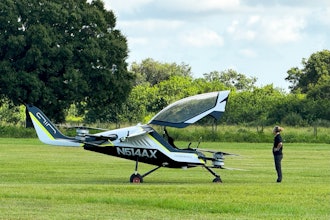WICHITA, Kan. (AP) -- Wichita's business jetmakers sometimes think about Detroit. Not that many years ago, U.S. automakers weren't too concerned about emerging foreign competitors.
Productivity was poor, costs were out of control, and they became complacent, said Cessna Aircraft CEO Jack Pelton. Eventually, they lost their dominance.
Wichita, as the Air Capital of the World, can't be in denial that what happened in Detroit could never happen here, Pelton said.
"We have to work to make sure we don't fall victim to similar circumstances," Pelton said.
With the entrance of Brazil-based Embraer, where labor costs are lower, price competition is fierce. Honda also is entering the business jet market and many expect other global competitors will too someday.
Wichita companies can compete, but "we've got to get to this cost issue," Pelton said. It also will help as planemakers struggle through a down economy.
The aviation industry is in a "global sourcing environment," leaders of the industry said recently.
"I don't think we can think about the world in any other way," said Spirit AeroSystems CEO Jeff Turner.
It's a controversial issue with unions and others who worry about high-paying manufacturing jobs leaving the U.S.
But the executives of Wichita's manufacturers spoke openly about the issue at a panel discussion, with analysts and in Eagle interviews over the past several weeks.
"It's about competitiveness. It's about quality. And it's about cost," said Hawker Beechcraft CEO Bill Boisture. "And in the end, how does the business persevere, survive and thrive."
As CEOs, their primary job is to keep their companies healthy.
"If that means we have to go wherever to find the resources to get the job done capital resources, people resources and get it done cost effectively, we're going to do that," Turner said.
Company leaders, however, say outsourcing isn't something to be feared.
Instead, Wichita's aviation industry must focus on how best to utilize the highly technical, highly skilled work force that's here and how to increase productivity.
"We've got to be really good at the things we're good at, do it at the places that make the most sense, and have a highly integrated supply network that has its headquarters and its key capacity in a place like Wichita," Turner said.
Wichita must change the way it views its aviation industry, the executives say.
"The Air Capital can't continue to operate as if it's the center of the aerospace universe but must recognize it's a 'node' in a vast global network that builds and buys aircraft," Turner said.
Wichita planemakers are working with suppliers to bring down the cost of building an airplane. They're working internally as well.
Everything is on the table.
Cessna and Hawker Beechcraft are consolidating facilities. Both are shifting some work to Mexico. Bombardier also has a plant there.
Cessna is shifting parts work from its Columbus, Ga., plant and some from Wichita to its facility in Chihuahua, Mexico.
Moving that work cuts labor costs by 50 percent, officials from Textron, Cessna's parent company, told analysts recently.
"When you think about the back room, a lot of the subassembly, a lot of the more labor-intensive work, a lot of that is what we're moving and, frankly, we have to move that to more cost-competitive places," Scott Donnelly, president and CEO of Textron, said.
Cessna will continue to make further assessments as time goes by, Donnelly said, although Pelton said that the company doesn't have a plan to move more work beyond what it has announced.
Like any of its Cessna facilities, its Mexican factory must be productive, Pelton said.
Long term, "the assumption is they will have a learning curve and get to a reasonable level of productivity," Pelton said. "We'll have to see."
Boisture acknowledges that moving work from Wichita is a controversial subject.
"Everybody wants everything to stay here," he said. "That's an understandable emotion, until you look at your shareholders or your board and say, 'Yes, I can be here, but here's my margin.' "
The move to put work in lower-cost countries is a direct response to high labor costs and finding less-expensive places to build parts of planes, Boisture said.
"It's no more complicated than that," Boisture said.
The price of an airplane can't rise fast enough to cover cost increases, Boisture said.
"This is a company whose costs are constantly increasing, and the market is not paying us back at the rate they're increasing," Boisture said.
In the past, Wichita business jetmakers Cessna, Bombardier Learjet and Hawker Beechcraft primarily competed with one another, so costs were similar.
In the future, literally "it's not going to be the guys across the street," said Textron's Donnelly.
There's every reason to believe new competitors will have lower cost structures, he said.
In addition, the majority of the orders for business jets are coming from global customers. And that's expected to grow.
"That means we're building stuff in the wrong place, because we're going to be selling it, servicing it and delivering it on the other side of the word," Boisture said.
That will take some flexibility to figure out what that means for the companies in the future, he said.
Outsourcing is not a "zero-sum game," Spirit's Turner said, although it can feel that way in the current down cycle.
Spirit has been a big recipient of outsourcing. Its facilities do work for Boeing, Airbus, Sikorsky, Gulfstream, Hawker Beechcraft and others.
Airbus turned to Spirit because the Wichita company was on its list of low-cost locations, Turner said.
Long-term, the market will return and grow. Historically, each up cycle has been more robust than the previous one.
"We ultimately have a growth industry," Turner said.
Eventually, the companies will need a trained work force. They're expecting a labor shortage when the economy turns around. The concept might sound bizarre considering thousands of Wichita workers were laid off in the past year.
But a shortage followed the downturn in the early part of the last decade, Turner said.
"It's going to happen."


















